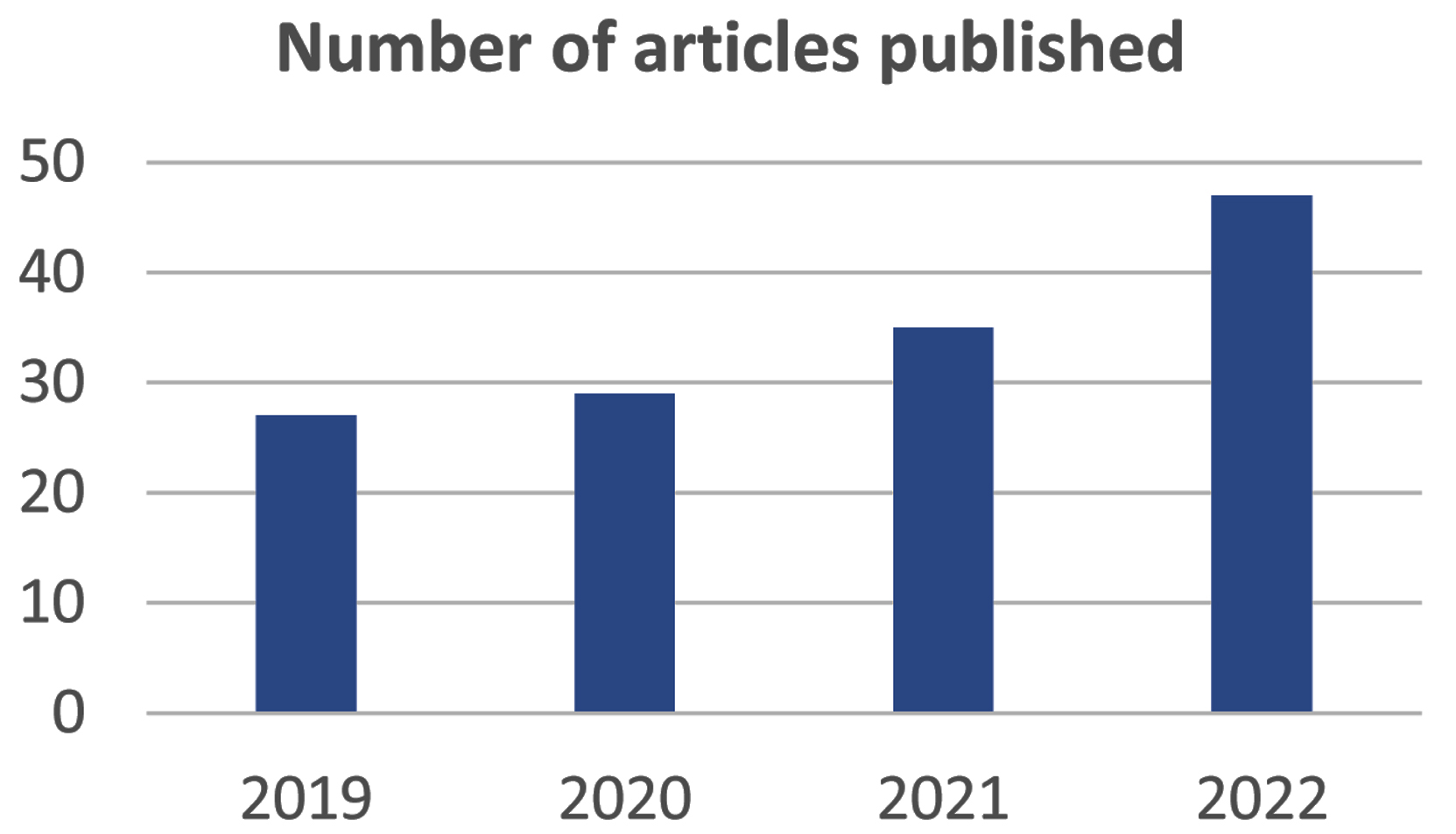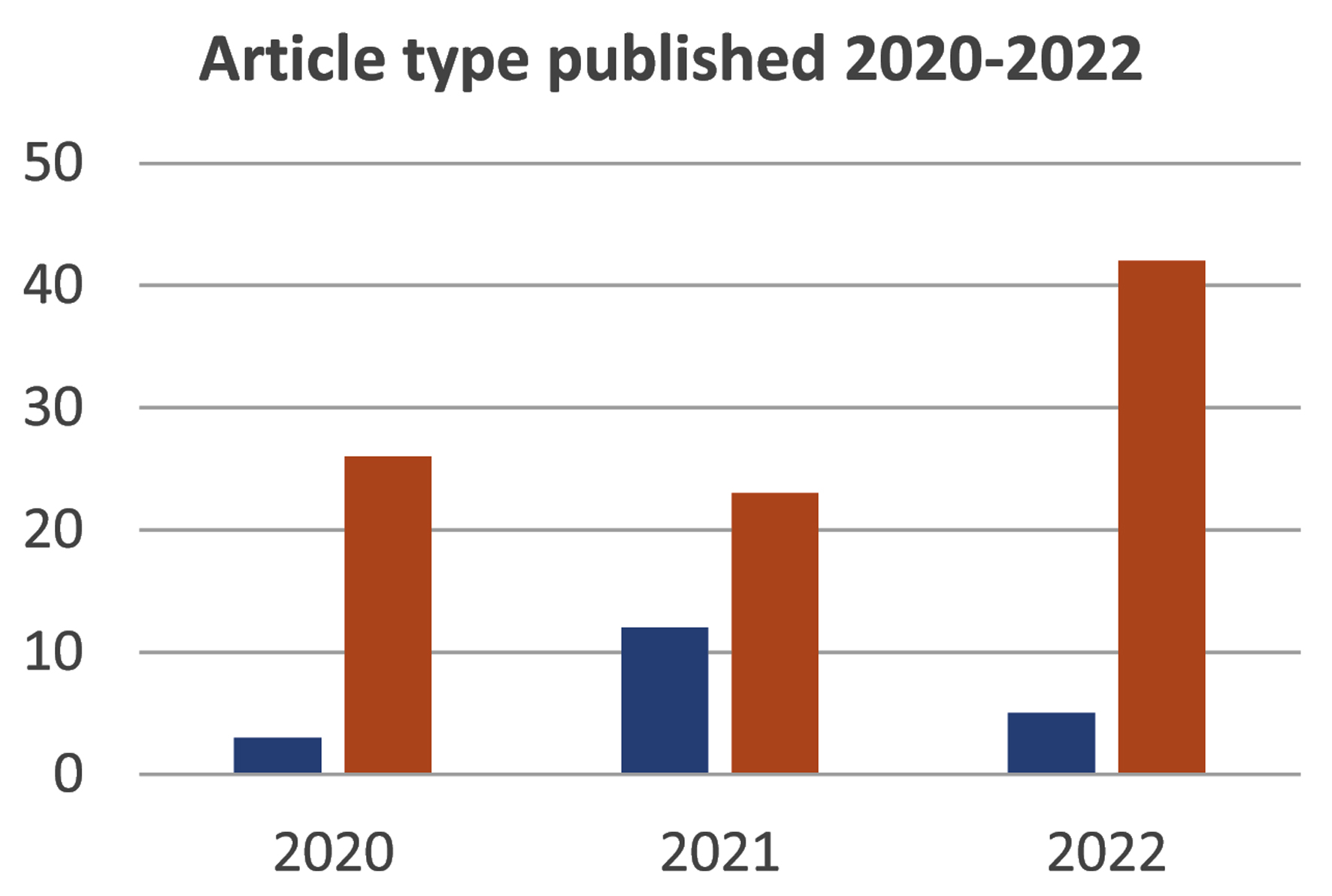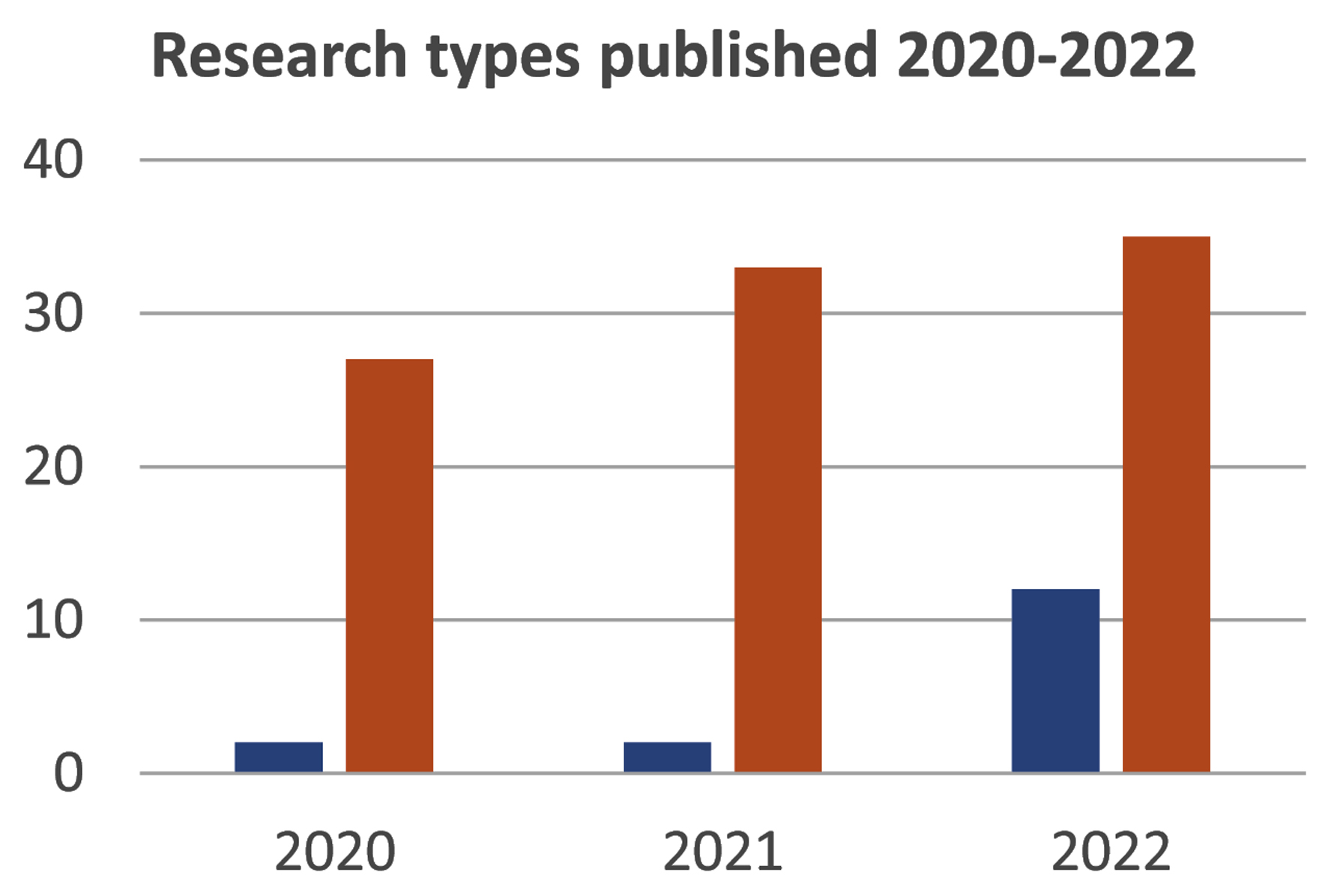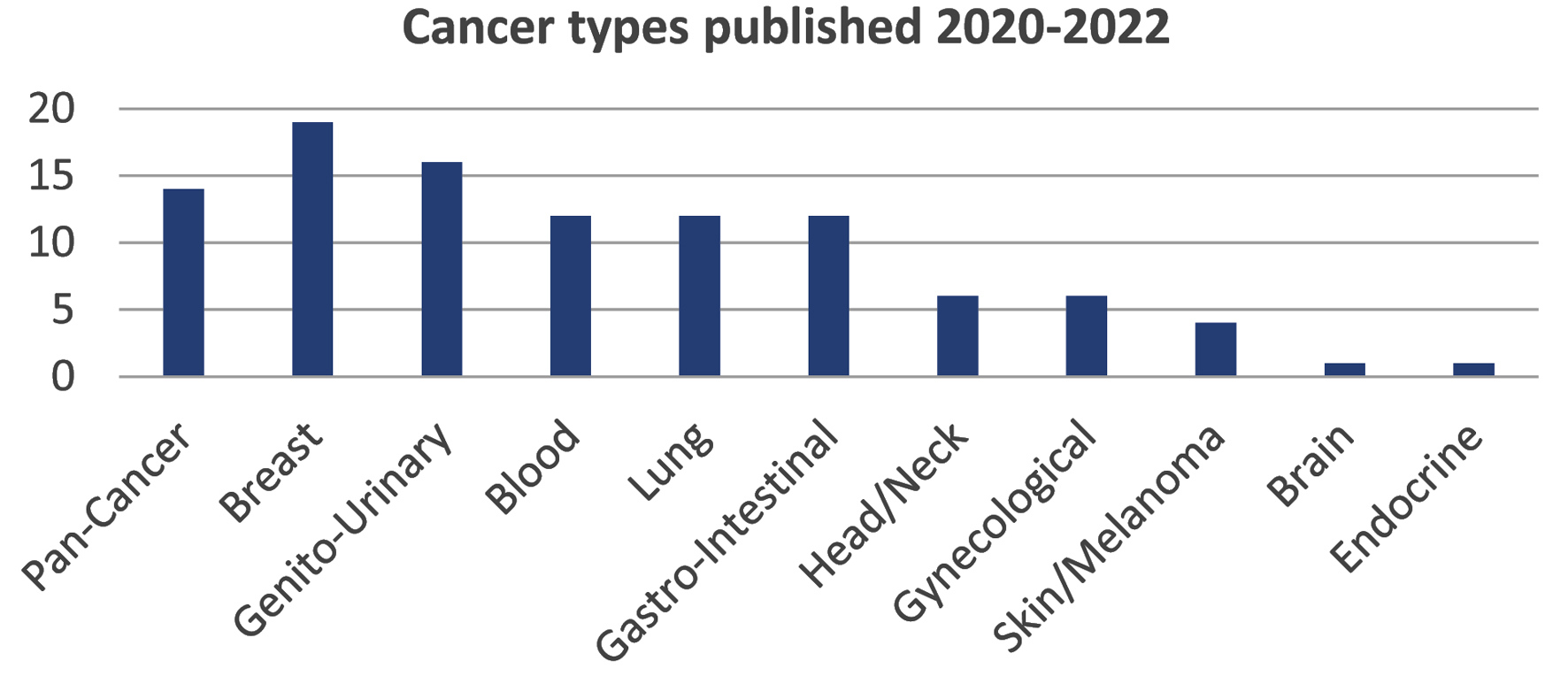| World Journal of Oncology, ISSN 1920-4531 print, 1920-454X online, Open Access |
| Article copyright, the authors; Journal compilation copyright, World J Oncol and Elmer Press Inc |
| Journal website https://www.wjon.org |
Editorial
Volume 13, Number 6, December 2022, pages 325-328
Types of Cancer and Research Covered in World Journal of Oncology
Kazuaki Takabea, g, Matthew G.K. Benescha
aDepartment of Surgical Oncology, Roswell Park Comprehensive Cancer Center, Buffalo, NY 14263, USA
bDepartment of Surgery, University at Buffalo Jacobs School of Medicine and Biomedical Sciences, The State University of New York, Buffalo, NY 14263, USA
cDepartment of Breast Surgery and Oncology, Tokyo Medical University, Tokyo 160-8402, Japan
dDepartment of Gastroenterological Surgery, Yokohama City University Graduate School of Medicine, Yokohama, Kanagawa 236-0004, Japan
eDepartment of Surgery, Niigata University Graduate School of Medical and Dental Sciences, Niigata, Japan
fDepartment of Breast Surgery, Fukushima Medical University, Fukushima, Japan
gCorresponding Author: Kazuaki Takabe, Roswell Park Comprehensive Cancer Center, Buffalo, NY 14263, USA
Manuscript submitted December 17, 2022, accepted December 20, 2022, published online December 24, 2022
Short title: Cancer and Research in World Journal of Oncology
doi: https://doi.org/10.14740/wjon1558
In the Focus and Scope section of this journal, it states that World Journal of Oncology publishes original contributions describing basic research and clinical investigation of cancer, on the cellular, molecular, prevention, diagnosis, therapy, translational oncology, and prognosis aspects. As such, the journal publishes manuscripts in both basic and clinical research of any cancer type. Since this is the last issue for 2022, it was deemed appropriate to summarize the publication trends of the last 3 years of our journal.
The total number of articles published in our journal has been steadily increasing each year for the last 4 years from 27 in 2019 to 47 in 2022 (Fig. 1). We expect to further increase the number of published high quality papers in the following years. In terms of article type, original articles have significantly increased particularly in 2022 (Fig. 2). This is favorable since original articles drive the field forward. On the other hand, review articles have decreased significantly from 12 in 2021 to 5 in 2022. Although they do not necessarily deliver novel discoveries, review articles are very useful to efficiently summary essential knowledge of the field. For instance, epidemiology was reviewed in pancreatic cancer by Rawala et al [1], in prostate cancer by Cassell et al [2] and Rawala [3], in renal cell carcinoma by Padala et al [4], and in malignant melanoma by Naik [5]. Review articles also provide an opportunity to learn about the latest updates and summaries on relatively rare conditions such as male breast cancer [6], urothelial carcinoma [7], mucoepidermoid carcinoma [8], retroperitoneal liposarcoma [9], and even on hemophagocytic lymphohistiocytosis, a relatively rare side effect of immune checkpoint inhibitor therapy [10]. There were several review articles on topics that apply to all types of cancer, such as infections in hospitalized cancer patients [11], genetic polymorphisms [12], tumor dormancy [13], and unstable psychiatric disorder [14]. To this end, we strongly encourage and welcome submission of review articles to our journal.
 Click for large image | Figure 1. Number of articles published in the World Journal of Oncology. Blue columns show the number of articles published in the indicated year. |
 Click for large image | Figure 2. Numbers of articles published in the World Journal of Oncology by the article type (2020 - 2022). Blue columns show the review articles, and orange columns show the original articles, published in the indicated year. |
The type of research publication that increased during the last 3 years was basic research articles, increasing from 2 in 2020 and 2021, to 12 in 2022 (Fig. 3). This year we have published multiple impressive basic research reports. For example, Bai et al reported that a cuproptosis-related signature identified the gene DLAT as a prognostic biomarker for hepatocellular carcinoma [15], where cuproptosis is a copper-induced novel form of programmed cell death that was just reported in the journal Science this year [16]. Peng et al reported the sialidase NEU1 as a biomarker in melanoma [17]. Liu et al found that promoter gene methylation regulates COX2 expression in prostate cancer [18], and Kurdi et al found that MRMT-promoter methylation associates with tumor-associated macrophages in advanced astrocytomas [19].
 Click for large image | Figure 3. Numbers of articles published in the World Journal of Oncology by the research type (2020 - 2022). Blue columns show the basic research articles, and orange columns show the clinical research articles, published in the indicated year. |
The number of articles and the cancer types are shown as Figure 4. The numbers roughly reflect the commonality of the cancer types, apart from common cancers like colorectal cancer and skin cancer including melanoma, about which few papers were published. In terms of the topics, our journal publishes articles that highlight racial and ethnic diversity [4, 20-29] as we mentioned previously [30]. In addition, we have noticed that there has been a huge increase in cancer immunology and immunotherapy interest. On immune checkpoint inhibition alone, Minami et al reported that sarcopenia and visceral adiposity did not affect its efficacy in lung cancer [31], Aly et al reported its use in sarcomatoid renal cell carcinoma [32], Tarekegn et al reported its use in relapsed/refractory classical Hodgkin lymphoma [33], Li et al reported its surrogate endpoints for gastro-esophageal carcinoma [34], and Rajapakse et al summarized one of its side effects [10]. Given the global pandemic of COVID-19 starting from 2020, our journal published three articles on this topic. Wu et al reviewed the impact of the COVID-19 pandemic on the lung cancer community [35], Hassan et al reported a case of a rare scalp leiomyosarcoma with a significantly delay in diagnosis and management because the patient did not seek medical attention for several months due to a combination of fear and decreased appointment availability [36], and Wang et al reported on COVID-19 vaccination in Chinese breast cancer patients [37].
 Click for large image | Figure 4. Numbers of articles published in the World Journal of Oncology by the cancer type (2020 - 2022). Blue columns show the number of articles published in the indicated cancer type. |
In summary, World Journal of Oncology has been expanding the number, cancer types, and article topics throughout the COVID-19 pandemic, and will continue to do so in the coming years.
Acknowledgments
None to declare.
Financial Disclosure
This research was supported by grants from the United States National Institutes of Health (R37CA248018, R01CA250412, R01CA251545, and R01EB029596) and the US Department of Defense (BCRP W81XWH-19-1-0674 and W81XWH-19-1-0111) to K.T. The National Cancer Institute Cancer Center Support Grant P30CA016056 supports Roswell Park Comprehensive Cancer Center.
Conflict of Interest
None to declare.
Author Contributions
Conceptualization and design of study, and data acquisition: KT. Editing of the paper: KT and MGKB.
Data Availability
The authors declare that data supporting the findings of this study are available within the article.
| References | ▴Top |
- Rawla P, Sunkara T, Gaduputi V. Epidemiology of pancreatic cancer: global trends, etiology and risk factors. World J Oncol. 2019;10(1):10-27.
doi pubmed - Cassell A, Yunusa B, Jalloh M, Mbodji MM, Diallo A, Ndoye M, Kouka SC, et al. A review of localized prostate cancer: an African perspective. World J Oncol. 2019;10(4-5):162-168.
doi pubmed - Rawla P. Epidemiology of prostate cancer. World J Oncol. 2019;10(2):63-89.
doi pubmed - Padala SA, Barsouk A, Thandra KC, Saginala K, Mohammed A, Vakiti A, Rawla P, et al. Epidemiology of renal cell carcinoma. World J Oncol. 2020;11(3):79-87.
doi pubmed - Naik PP. Cutaneous malignant melanoma: a review of early diagnosis and management. World J Oncol. 2021;12(1):7-19.
doi pubmed - Sabih QA, Young J, Takabe K. Management of male breast cancer: the journey so far and future directions. World J Oncol. 2021;12(6):206-213.
doi pubmed - Cassell A, 3rd, Manobah B, Willie S. Diagnostic and therapeutic challenges of rare urogenital cancers: urothelial carcinoma of the renal pelvis, ureters and urethra. World J Oncol. 2021;12(1):20-27.
doi pubmed - Sama S, Komiya T, Guddati AK. Advances in the treatment of mucoepidermoid carcinoma. World J Oncol. 2022;13(1):1-7.
doi pubmed - Marjiyeh-Awwad R, Mansour S, Khuri S. Giant retroperitoneal liposarcoma: correlation between size and risk for recurrence. World J Oncol. 2022;13(5):244-248.
doi pubmed - Rajapakse P, Andanamala H. Hemophagocytic lymphohistiocytosis secondary to immune checkpoint inhibitor therapy. World J Oncol. 2022;13(2):49-52.
doi pubmed - Delgado A, Guddati AK. Infections in hospitalized cancer patients. World J Oncol. 2021;12(6):195-205.
doi pubmed - Gummadi AC, Guddati AK. Genetic polymorphisms in pharmaceuticals and chemotherapy. World J Oncol. 2021;12(5):149-154.
doi pubmed - Balayan V, Guddati AK. Tumor Dormancy: Biologic and Therapeutic Implications. World J Oncol. 2022;13(1):8-19.
doi pubmed - Bellman V, Russell N, Depala K, Dellenbaugh A, Desai S, Vadukapuram R, Patel S, et al. Challenges in treating cancer patients with unstable psychiatric disorder. World J Oncol. 2021;12(5):137-148.
doi pubmed - Bai WD, Liu JY, Li M, Yang X, Wang YL, Wang GJ, Li SC. A Novel Cuproptosis-Related Signature Identified DLAT as a Prognostic Biomarker for Hepatocellular Carcinoma Patients. World J Oncol. 2022;13(5):299-310.
doi pubmed - Tsvetkov P, Coy S, Petrova B, Dreishpoon M, Verma A, Abdusamad M, Rossen J, et al. Copper induces cell death by targeting lipoylated TCA cycle proteins. Science. 2022;375(6586):1254-1261.
doi pubmed - Peng Q, Gao L, Cheng HB, Wang JS, Wang J. Sialidase NEU1 May Serve as a Potential Biomarker of Proliferation, Migration and Prognosis in Melanoma. World J Oncol. 2022;13(4):222-234.
doi pubmed - Liu CY, Su SH, Chang TH, Hsieh ML, Chang YH, Pang JS, Chuang CK. Promoter gene methylation regulates clooxygenase-2 expression in androgen-dependent and independent prostate cancer cells. World J Oncol. 2022;13(3):107-116.
doi pubmed - Kurdi M, Katib Y, Faizo E, Bahakeem B, Alkhotani A, Alkhayyat S, Najjar AA, et al. Association Between CD204-Expressed Tumor-Associated Macrophages and MGMT-Promoter Methylation in the Microenvironment of Grade 4 Astrocytomas. World J Oncol. 2022;13(3):117-125.
doi pubmed - Adeniji AA, Dulal S, Martin MG. Personalized medicine in oncology in the developing world: barriers and concepts to improve status Quo. World J Oncol. 2021;12(2-3):50-60.
doi pubmed - Dulal S, Adeniji AA, Martin MG. Feasibility of fewer fraction palliative radiotherapy in resource-limited setting. World J Oncol. 2020;11(2):76-77.
doi pubmed - Alqahtani WS, Almufareh NA, Al-Johani HA, Alotaibi RK, Juliana CI, Aljarba NH, Alqahtani AS, et al. Oral and oropharyngeal cancers and possible risk factors across gulf cooperation council countries: a systematic review. World J Oncol. 2020;11(4):173-181.
doi pubmed - Copeland J, Oyedeji A, Powell N, Cherian CJ, Tokumaru Y, Murthy V, Takabe K, et al. Breast cancer in Jamaica: stage, grade and molecular subtype distributions across age blocks, the implications for screening and treatment. World J Oncol. 2021;12(4):93-103.
doi pubmed - Adeniji AA, Dawodu OO, Habeebu MY, Oyekan AO, Bashir MA, Martin MG, Keshinro SO, et al. Distribution of breast cancer subtypes among Nigerian women and correlation to the risk factors and clinicopathological characteristics. World J Oncol. 2020;11(4):165-172.
doi pubmed - Macari A, Soberanis-Pina P, Varela-Santoyo E, Valle-Sanchez MA, Leal-Hidalgo JL, Torres-Guillen VM, Motola-Kuba D, et al. Prevalence and molecular profile of breast carcinoma using immunohistochemistry markers in Mexican women. World J Oncol. 2021;12(4):119-123.
doi pubmed - Hernandez-Ruiz E, Alvarado-Ibarra M, Juan Lien-Chang LE, Banda-Garcia L, Aquino-Salgado JL, Barragan-Ibanez G, Ramirez-Romero EF, et al. Epidemiology and clinical characteristics of non-Hodgkin lymphoma in Mexico. World J Oncol. 2021;12(1):28-33.
doi pubmed - Fernandez-Ferreira R, Dorantes-Heredia R, Motola-Kuba D, Ruiz-Morales JM, Alvarado-Luna G, Kinney-Novelo IM, Munoz-Montano WR, et al. Epithelial-cadherin expression is associated with better recurrence-free and overall survival in invasive lobular breast cancer in Mexican women. World J Oncol. 2021;12(6):214-224.
doi pubmed - Fernandez-Garza LE, Dominguez-Vigil IG, Garza-Martinez J, Valdez-Aparicio EA, Barrera-Barrera SA, Barrera-Saldana HA. Personalized medicine in ovarian cancer: a perspective from Mexico. World J Oncol. 2021;12(4):85-92.
doi pubmed - Nakano H, Miyamoto T, Janjigian YY, Mine S, Mitsuya H, Ueno NT, Sharon E, et al. Advances in oncology in US and Japan: focusing on cancer and infectious diseases. World J Oncol. 2021;12(6):183-194.
doi pubmed - Takabe K, Day V, Benesch MGK. The dimensions of reports from around the world that address diversity in oncology. World J Oncol. 2022;13(5):241-243.
doi pubmed - Minami S, Ihara S, Komuta K. Sarcopenia and visceral adiposity are not independent prognostic markers for extensive disease of small-cell lung cancer: a single-centered retrospective cohort study. World J Oncol. 2020;11(4):139-149.
doi pubmed - Aly R, Aujla AS, Gupta S, Gupta R, Gupta S, Kalathil S. Evolving paradigms in the management and outcomes of sarcomatoid renal cell carcinoma in the era of immune checkpoint inhibitors. World J Oncol. 2020;11(5):183-187.
doi pubmed - Tarekegn K, Colon Ramos A, Singh B, Sequeira Gross HG, Gupta S. Checkpoint inhibitors in relapsed/refractory classical hodgkin lymphoma. World J Oncol. 2021;12(4):81-84.
doi pubmed - Li YF, Wang Y, Zhou J, Wei YC, Lin J, Yin YX, Chen GM, et al. Surrogate endpoints for overall survival in immune-oncology trials of advanced gastro-esophageal carcinoma. World J Oncol. 2022;13(3):126-135.
doi pubmed - Wu L, Zhang C, Zhao X. The impact of COVID-19 pandemic on lung cancer community. World J Oncol. 2021;12(1):1-6.
doi pubmed - Hassan H, Elazar A, Takabe K, Datta R, Takahashi H, Seitelman E. Scalp leiomyosarcoma: diagnosis and treatment during a global pandemic with COVID-19. World J Oncol. 2021;12(4):132-136.
doi pubmed - Wang XY, Liu Q, Zhang WX, Wang T, Wang NC, Wang ZZ, Fang Y, et al. External supports are associated with the COVID-19 vaccination in chinese breast cancer patients: a cross-sectional survey. World J Oncol. 2022;13(4):172-184.
doi pubmed
This article is distributed under the terms of the Creative Commons Attribution Non-Commercial 4.0 International License, which permits unrestricted non-commercial use, distribution, and reproduction in any medium, provided the original work is properly cited.
World Journal of Oncology is published by Elmer Press Inc.


